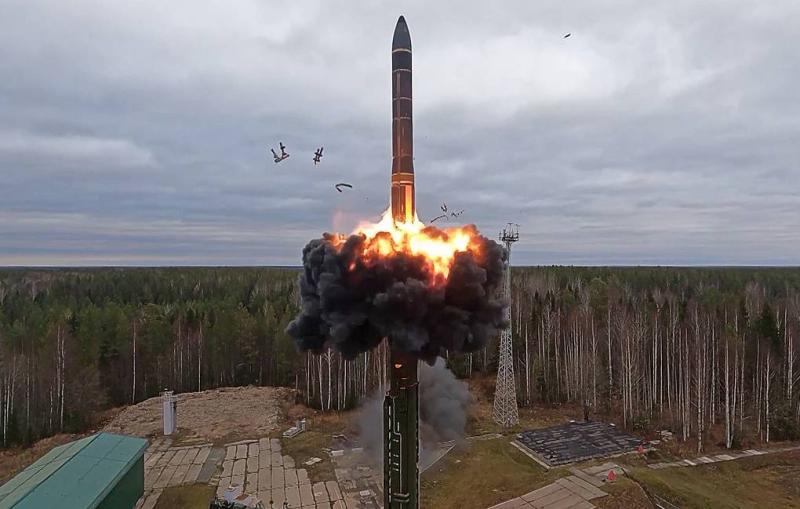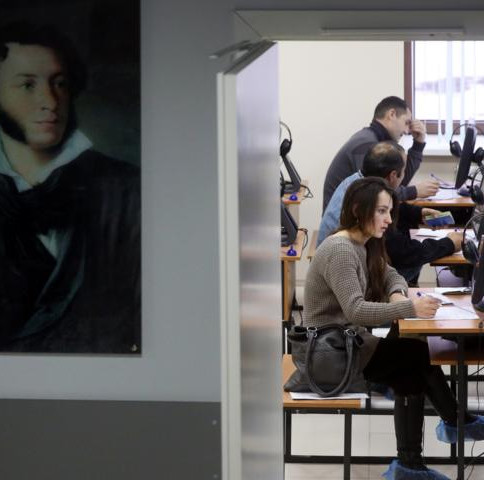
© Russian Defence Ministry/TASS
Top stories from the Russian press on Thursday, October 27th, prepared by TASS
Izvestia: Reasons for Russia’s strategic nuclear forces drills revealed
On October 26, Russian President Vladimir Putin oversaw Russia’s strategic nuclear forces drills dubbed "Grom-2022". A massive nuclear strike was simulated as a reaction to a nuke hitting Russia, according to the maneuvers' legend. All three components of the Russian nuclear triad were used for the training launches on the first day. The drills, which are taking place against the backdrop of NATO's exercises in Europe, have many objectives, according to experts interviewed by Izvestia, one of which is to serve as a reminder that there are no winners in a nuclear war.
Dmitry Kornev, editor of MilitaryRussia, told Izvestia that "this time the exercises of the strategic forces are devoted to an unusual subject which has not been seen before: they were training to carry out a major retaliatory strike on a nuclear strike on Russian territory." There are various reasons such exercises should be performed occasionally, the expert noted.
"First, practice is required. Second, the drills are being held at the same time as NATO’s nuclear exercises in Europe. Therefore, I think this is not a coincidence. NATO is training, and so are we. We are demonstrating that our strategic nuclear forces are ready for any unforeseen circumstances. Moreover, the drills by the strategic nuclear forces during the special military operation show that there is no need for some third forces to interfere with the operation," he added.
"Russia's military doctrine is founded on the notion that we do not deliver the first nuclear strike," former Deputy Foreign Minister Sergey Ordzhonikidze told Izvestia. "We launch a nuclear strike if our country is attacked, if there is an existential threat. And the United States doesn't have that. Simulating attacks on our country, they follow the concept of a preemptive strike. In a way, the Russian nuclear triad exercises were in response to the US. To remind them that there can never be a victor in a nuclear war," he added.
Kommersant: Kiev pressing West for more air defense systems
The Zelensky regime's efforts to get military aid from the West, particularly air defense systems, are paying off. The first NASAMS anti-aircraft missile systems were shipped to Ukraine by the United States. Air defense systems will continue to be provided by Germany to the Ukrainians, according to President Frank-Walter Steinmeier, who made the announcement while visiting Kiev. The struggle against the missile threat became more prominent following Russia’s massive attacks against Ukraine’s critical infrastructure, Kommersant writes.
Judging by the comments about the current situation on the front, the Kiev regime is extremely interested in any military assistance from Western countries. However, the emphasis on fending off the missile threat took top priority after Russia’s airstrikes on Ukrainian infrastructure (in particular, energy facilities) during the first half of October.
Military help would improve Ukraine's negotiation position, according to NATO Secretary General Jens Stoltenberg. However, right now any negotiations are off the table, the newspaper writes, and this is only because Kiev refused to conduct them with the current Russian leadership. Ukrainian analysts and journalists covering the operation noted that there are heavy battles on the front lines, and the Russians have the upper hand.
After the Ukrainian army's victories in September, Russia’s new tactics clearly complicated the situation for Kiev. Massive strikes by kamikaze drones, which are much cheaper than missiles, sidetrack Ukrainian air defense, and only after that Russia uses missile strikes. Combining attacks makes is possible to hit more targets.
Izvestia: Berlin and Paris put relations to test
Europe's leading partnership between Berlin and Paris is going through difficult times. The Elysee Palace-hosted meeting between Germany’s Olaf Scholz and France’s Emmanuel Macron on October 26 showed it will not be so easy to overcome the discord that has plagued both countries over the past months, Izvestia writes.
Following the summit, Scholz only remarked that the leaders had a "very good and important conversation" about energy supplies to Europe, inflation and joint defense projects. There was no press conference by the two leaders after the meeting, as Scholz reportedly had no time.
According to Izvestia, one reason Paris and Berlin were unsatisfied with one another was over the energy dilemma. France disagrees with Scholz's intentions to provide German businesses and households with a 200-bln euro state energy subsidy rather than having all of Europe adopt gas price caps, which France favors. Germany, on the other hand, does not support returning to the MidCat pipeline project, which runs from the Iberian Peninsula to Northern Europe.
Former Prime Minister of France Dominique de Villepin told Izvestia there is a breach between the nations at a time when they particularly cannot afford it. He believes that if the nations are not united, they will fall victim to the US economy and its security system.
France accuses Germany of buying armaments from the United States. But on the other hand, France itself complicates European arms projects by presenting treaties that favor Paris unilaterally, Jan Nolte, a member of the Bundestag Defense Committee from the Alternative for Germany party, noted in a conversation with Izvestia.
Along with the defense and energy concerns, the parties disagreed on Scholz's upcoming trip to China, a crucial matter of foreign policy. According to Paris, it would have been better if Macron and Scholz visited China together.
Kommersant: Russia takes lead in Azerbaijan - Armenia mediation effort
A new meeting between the leaders of Azerbaijan and Armenia, Ilham Aliyev and Nikol Pashinyan, is to be held next week in Sochi, mediated by Russian President Vladimir Putin. The talks give Moscow a chance to grab the lead in mediating from Brussels. However, according to Kommersant’s sources in Yerevan and Baku, the Kremlin's proposals have long been well-known, and it is unlikely that something fundamentally new will be proposed in Sochi. And just a couple of weeks later, Pashinyan and Aliyev once again will have to meet in Brussels.
"According to open sources, Russia’s proposed draft peace treaty suits neither Azerbaijan nor Armenia," Azerbaijan-based political scientist Farhad Mammadov told Kommersant. Meanwhile, Chairman of the board of the Center for Analysis of International Relations Farid Shafiyev told Kommersant that "meetings with the Russian President are still important to understand how the Kremlin views peaceful coexistence of the two countries."
"It is difficult to determine whether fresh ideas for settling the conflict will be provided to the parties in Sochi or whether the meeting will be convened to once again demonstrate Moscow's involvement in the process," Armenian political scientist David Arutyunov told the newspaper. He believes that the European version of the settlement is in fact better for Azerbaijan and that it is unclear exactly how Moscow plans to advance its own version. According to the expert, Russia's capacity for overall foreign policy, which is currently mostly focused on Ukraine, is tied to the efficacy of its mediation efforts. This element, he continued, "may have contributed to Baku's rejection of the Russian version of the treaty, which deferred discussion of Karabakh's status."
Vedomosti: US officials blame Saudi Arabia for violating secret deal to build up oil output
White House Press Secretary Karine Jean-Pierre said on October 25 that the United States has not yet worked out measures to revise its relationship with Saudi Arabia due to the OPEC+ oil production cuts. According to recent media reports, the Saudis allegedly violated a secret promise made to the United States in the spring to increase oil production, Vedomosti writes.
On October 5, OPEC+ decided to cut oil production by 2 mln barrels per day, the highest level since 2020. According to the New York Times, this violated secret agreements between Washington and Riyadh over the anticipated increase in production. The terms of this agreement are said to have been negotiated between the United States and Saudi Arabia in the spring and an agreement was allegedly reached in May.
According to Vladimir Isaev, a professor at Moscow State University's Institute of Asian and African Countries, Saudi Arabia, like other Middle Eastern oil-producing nations, has now felt its strength amid the energy crisis and its own rapid economic growth rates, so Arab countries, including those formally allied to the US, are unlikely to buckle under direct or indirect US pressure.
The US may attempt to pressure Riyadh by restricting the delivery of weapons, but they risk losing $40 bln in contracts and having their weapons replaced by those of rival nations, particularly Russia, the expert warned. Additionally, following Jamal Khashoggi's death, there is still interpersonal animosity between the two nations. According to Isaev, as long as Biden is in office, there will be no political warming of relations and no real pressure on Riyadh.









